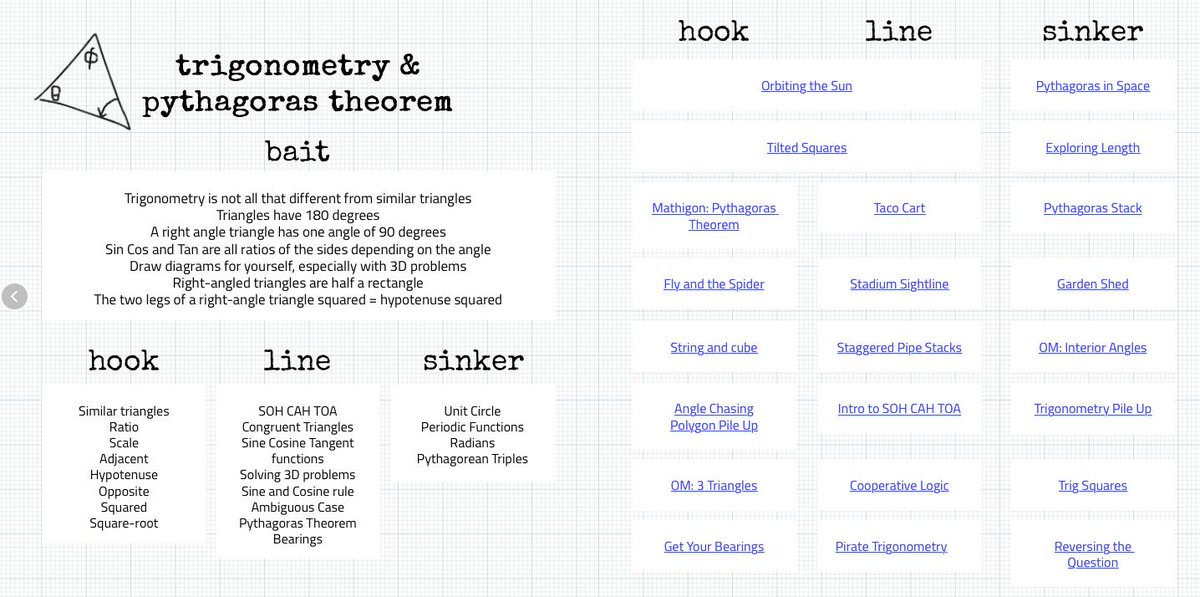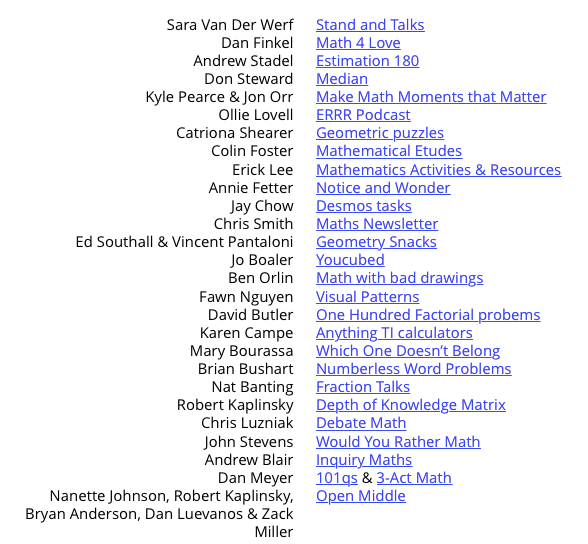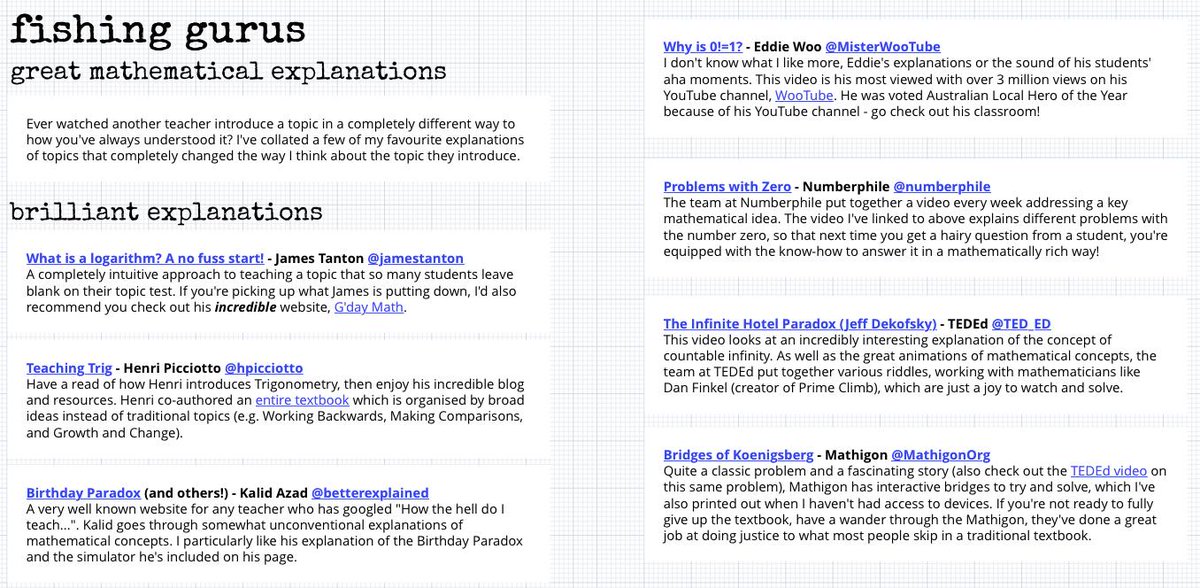I’m pretty excited about this TOT because there are some really fantastic resources to share.
Firstly, the resource ‘Hook, Line, Sinker’ by @MrJohnRowe. John has brought together a wonderful collection of fantastic resources from a whole host of places, and organised them under topics for teachers to use. I provide much more detail below, please check it out.
T2 is a great (and concise) paper on problem solving in maths. Not to be missed.
T3 is an excerpt from a paper that I found very interesting (though it was from a small sample, wouldn’t take the findings as gospel)
I’ll let the titles of T4 to 7 speak for themselves.
T8 is a nice demonstration of a teacher being open to a student running an experiment in their classroom!
T9 to 13 can speak for themselves too.
T14 is some snippets from a book that I read for the upcoming ERRR podcast (the one after next, to be released May 1st), The Writing Revolution. This book was fantastic and gave me a much better understanding of how writing can be taught. Loved it!
T15, 16, and 17 are a resource/just for fun, but I think well worth having a squiz at.
Enjoy : )
If you’d like to support Teacher Ollie’s Takeaways and the Education Research Reading Room podcast, please check out the ERRR Patreon page to explore this option. Any donation, evan $1, is appreciated.
(all past TOTs here), sign up to get these articles emailed to you each week here.
Hook , Line, Sinker. A maths teaching resource from @MrJohnRowe
ATTENTION ALL MATHS TEACHERS! I must commend @MrJohnRowe for his generous creation of an exquisite maths teaching resource! His free ebook, ‘Hook, Line and Sinker’ includes: a one pager of quality resources for the topics of trig (see image), linear algebra, indices (1/5)
This is definitely going to be one of the first places I go when teaching new topics in future. Thanks for sharing @MrJohnRowe ! Here’s the link: https://mrrowe.com/book/
A wonderful summary of key things that maths teachers should know about mathematical problem solving, via @colinfoster77

This would be a perfect reading to spark discussion, or design a problem solving program, within a maths department. Link: atm.org.uk/write/MediaUpl… Thanks to @mrbartonmaths for the heads up on this one. @mic_epstein, you’ll love this for your upcoming workshop.
What makes a successful department in a school?
Having a bit of a look into what makes a successful department within a school. This is an interesting summary from Alma and colleagues. Interesting to reflect upon which of these areas I've made good progress in, and which require more focus. https://t.co/IJ9UnV8Tj7 pic.twitter.com/6FfVctJ08v
— Oliver Lovell (@ollie_lovell) March 4, 2019
Life hack for calculating percentages, via @stephens_ben
Fascinating little life hack, for doing percentages:
x% of y = y% of x
So, for example, if you needed to work out 4% of 75 in your head, just flip it and and do 75% of 4, which is easier.
— Ben Stephens (@stephens_ben) March 3, 2019
May 20th, 2019. They day we will re-define some physical constants
This is pretty exciting. On May 20th this year a whole heap of SI units are going to be re-defined in terms of physical constants. Definitely a day to celebrate with the physics students! https://t.co/atv1pqSmeI pic.twitter.com/gdCJWoBwTn
— Oliver Lovell (@ollie_lovell) March 11, 2019
A great piece on the what makes synthetic phonics different from, and better than, other approaches to early reading instruction, via @ParkerPhonics, ht @dylanwiliam
This is the best summary I have seen on how synthetic phonics differs from—and why it is better than—other approaches to early reading instruction. It’s not often that I bother to enter a blog into my EndNote database, but this one’s a definite. https://t.co/UAZh3oIpLE
— Dylan Wiliam (@dylanwiliam) March 13, 2019
Dan Willingham critiques Jo Boaler’s recent piece on neuroscience and maths education, via @DTWillingham and @NumCog
Blog post by @NumCog and @DTWillingham taking issue with @joboaler‘s recent piece on neuroscience and math education in @TIMEMagazine_ https://t.co/vdbOfpJA95
— Daniel Willingham (@DTWillingham) March 13, 2019
‘I tried flexible seating’, a classroom experiment from @effortfuleduktr
‘I Tried Flexible Seating’, I love how Blake let a student run an experiment with their classroom seating arrangements! https://t.co/qPURfpvZTH via @effortfuleduktr
— Oliver Lovell (@ollie_lovell) March 16, 2019
An interesting discussion of homework, arising from a large-scale study
An interesting discussion of homework.
I hadn’t heard of ‘The 10 minute rule’ before 🙂 https://t.co/4wp006VDdP pic.twitter.com/GGaxvIZa6E— Oliver Lovell (@ollie_lovell) March 19, 2019
What academic writing looks like, a dissection
‘What academic writing looks like’. An interesting dissection of writing. https://t.co/W8LYvpA3Y8 tag @JudithCHochman
— Oliver Lovell (@ollie_lovell) March 16, 2019
Research scholars to air problems with using ‘grit’ at school.
Research scholars to air problems with using ‘grit’ at schoolhttps://t.co/DhFF5qrKGB
— Oliver Lovell (@ollie_lovell) March 14, 2019
GCSE & A-Level physics teaching lessons and resources, via @BenyohaiPhysics
All of my lessons from last year AQA GCSE & A-Level Physics and GCSE Chemistry https://t.co/EGeRR0Hupu. Gaps where new lessons need to be created and lots (I mean lots!) to change and improve this year. #SharingIsCaring pic.twitter.com/JsfIvtt22f
— Matthew Benyohai (@BenyohaiPhysics) August 14, 2018
Chemistry teaching resources (from the U.K) galore, via @adamboxer1
All the SLOP you need. Great chemistry teaching resources via @adamboxer1 . https://t.co/CpVyYdwuwf
— Oliver Lovell (@ollie_lovell) March 14, 2019
The Writing Revolution, a taster, with @JudithCHochman
Sentence expansion. One of the techniques from @JudithCHochman's 'The Writing Revolution'. Applied to maths. Reminds me Clumsy Clive by @andylutwyche, but with additional literacy scaffolding. This is pretty great! pic.twitter.com/NLpVrMmGCE
— Oliver Lovell (@ollie_lovell) February 28, 2019
Showing students the power of using 'transitions' in their writing. A great example from @JudithCHochman's 'The Writing Revolution' pic.twitter.com/180o3PYd8r
— Oliver Lovell (@ollie_lovell) March 2, 2019
While we're at it, this is a great table! pic.twitter.com/1IMK2AzhcI
— Oliver Lovell (@ollie_lovell) March 2, 2019
A new mind-mapping software
Some pretty cool mind-mapping software : ) https://t.co/Kpi1x7p6cm
— Oliver Lovell (@ollie_lovell) February 27, 2019
An image of what the world looked like around 300 milion years ago, #Pangea, via @simongerman600
This is one of my all time favourite maps. It shows the super-continent #Pangea (300M-175M years ago) with modern political boundaries. Source: https://t.co/0cOEnmUUn3 pic.twitter.com/Xr7MimuJY8
— Simon Kuestenmacher (@simongerman600) February 25, 2019
Just for fun: The Geneva Drive, converting continuous to discrete motion! via @fermatslibrary
Geneva Drive: A mechanism that converts continuous motion into discrete motion.
The name was derived from its usage in mechanical watches which were popularized in Geneva. This mechanism can also be found in movie projectors, banknote counting machines… pic.twitter.com/XdcnBNXSjb
— Fermat's Library (@fermatslibrary) March 1, 2019



